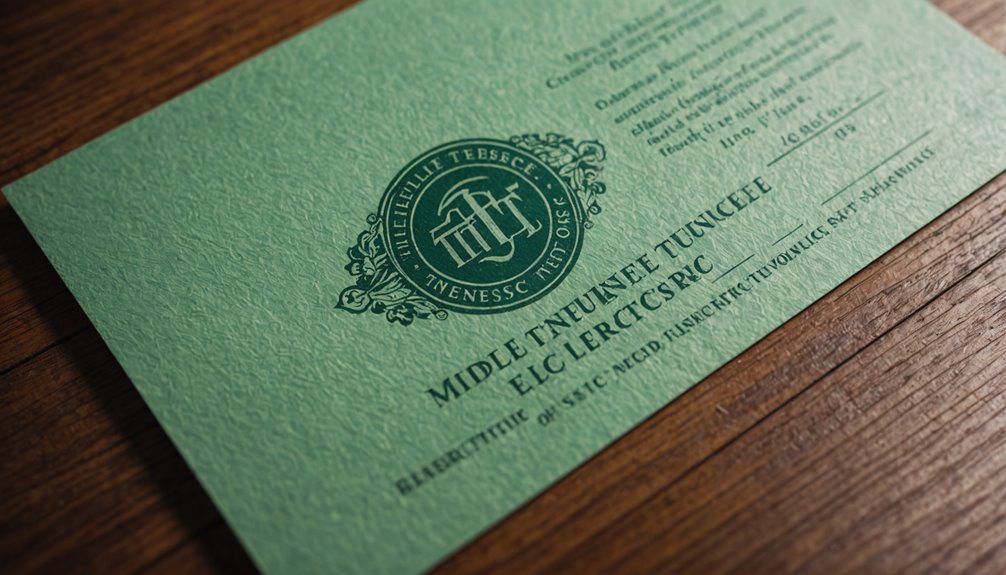When you're considering starting service with Middle Tennessee Electric Membership Corporation, understanding the utility deposit bond can make a significant difference. This bond not only saves you from placing a large cash deposit but also assures the utility company of your commitment to timely payments. It's designed for various customers, including individuals and businesses, but you might wonder about the specifics of how it works and the advantages it offers. What if this bond could simplify your transition to utility services in unexpected ways?
Overview of Utility Deposit Bonds

Utility deposit bonds serve as a financial safety net for utility companies, ensuring they receive payment for services rendered. When you're setting up utility services, these bonds act as a guarantee that the provider can recover costs if you fail to pay your bills.
Essentially, you're agreeing to a form of insurance that protects both you and the utility company.
If you're a new customer or have a less-than-stellar credit history, a utility deposit bond might be required. This bond reassures the utility company of your commitment to pay for services, reducing their risk in providing you with electricity, water, or gas.
You might find that the bond amount varies depending on the utility provider and your specific circumstances, including creditworthiness.
Purpose of the Deposit Bond
The purpose of a deposit bond is to provide security for both you and the utility provider. When you enter into a service agreement, the utility company wants assurance that you'll meet your financial obligations. By securing a deposit bond, you demonstrate your commitment to paying your bills on time, which can help build trust between you and the provider.
Additionally, a deposit bond can protect you from unexpected costs. If you're unable to pay your utility bill, the bond can cover the outstanding amount, ensuring that the utility provider doesn't incur losses. This arrangement creates a safety net for both parties.
Moreover, having a deposit bond can streamline the service initiation process. In many cases, it can eliminate the need for a hefty upfront cash deposit. Instead, you can secure your utility service without tying up significant funds.
In essence, the deposit bond serves as a win-win solution. It safeguards the utility provider's interests while allowing you to access services with less immediate financial burden.
Understanding its purpose helps you navigate the utility landscape more effectively, ensuring a smooth relationship with your provider.
Who Needs a Deposit Bond

For many individuals and businesses, a deposit bond becomes essential when establishing new utility services. If you're moving to a new location or starting a business, you might face the requirement of a deposit to secure your electricity service. This is particularly true if you have a history of credit issues or limited credit history.
Landlords, property managers, and business owners often need deposit bonds when setting up utilities for new tenants or commercial spaces. If you're managing a rental property, a deposit bond can help cover potential unpaid utility bills, protecting your investment.
Additionally, non-profit organizations or community services may also require deposit bonds, especially when setting up utilities in new facilities. In some areas, utility surety bonds are mandated by local utility companies, making them a crucial part of the process.
If you find yourself in any of these situations, a deposit bond can be a convenient solution, allowing you to bypass the upfront cash deposit while ensuring service continuity.
How the Bond Works
Understanding how a deposit bond works can simplify the process of securing your utility services. When you apply for utility services and need a deposit bond, you essentially provide a guarantee to the utility company. This bond replaces the traditional cash deposit, making it easier for you to start your services without tying up your funds.
When you choose a deposit bond, you typically work with a surety company that issues the bond on your behalf. You'll pay a premium to this company, which is often a fraction of the cash deposit you'd usually pay. This premium is non-refundable but allows you to avoid a large upfront payment.
Once the bond is in place, the utility company can claim against the bond in case of unpaid bills or other defaults. It's important to maintain good payment habits, as failing to pay your utility bills could affect your credit and potentially lead to losing the bond. Additionally, similar to Louisiana's surety bonds, the deposit bond provides financial assurance to the utility provider in case of default by the customer.
Benefits for Customers

Opting for a deposit bond offers several benefits for customers looking to secure utility services. First and foremost, you won't have to fork over a hefty cash deposit upfront. Instead, a deposit bond allows you to provide a financial guarantee without tying up your funds, making it easier to manage your budget.
Additionally, a deposit bond can enhance your creditworthiness in the eyes of utility providers. When you present a bond, it demonstrates your commitment to fulfilling your financial obligations, which might lead to favorable terms or lower rates in the future.
Another significant advantage is the simplicity of the process. With a deposit bond, you can often bypass extensive credit checks, allowing for quicker access to services. This means you won't have to wait long to get connected.
Lastly, having a deposit bond can provide peace of mind. You'll know that you've taken the necessary steps to secure your utility services, allowing you to focus on other important aspects of your life.
Benefits for MTE
Implementing a deposit bond system provides multiple benefits for Middle Tennessee Electric (MTE).
First, it enhances cash flow management. By requiring a bond instead of a cash deposit, you keep your capital available for other critical operational needs, making it easier to invest back into infrastructure and services.
Additionally, a deposit bond system reduces administrative burdens. You won't have to handle cash deposits, which often involve tracking, managing, and returning funds.
This streamlined approach frees up resources, allowing your team to focus on more pressing tasks.
Moreover, it strengthens customer relationships. Offering a bond option can attract new customers who may hesitate to pay upfront deposits.
You create a more welcoming environment and build trust by providing flexibility in payment options.
Finally, using a deposit bond can mitigate financial risk. It ensures that you're protected against potential defaults without tying up significant resources.
This way, you maintain a healthier balance sheet while still meeting your obligations. Furthermore, the use of surety bonds can enhance your overall risk management strategy, providing additional security for your operations.
Deposit Bond Application Process

Applying for a deposit bond with Middle Tennessee Electric is a straightforward process designed to make it easy for you.
First, you'll need to gather the necessary documentation, which typically includes proof of identity and address. This can be a driver's license, utility bill, or any official correspondence that verifies your information.
Once you have your documents ready, you can fill out the application form. You can usually find this form online on the Middle Tennessee Electric website or at their local office. Make sure to provide accurate details to avoid any delays in processing.
After submitting your application, you may need to wait for a brief period while they review your information. If your application is approved, you'll receive confirmation and instructions on the next steps, including any associated fees.
In case of any questions or concerns during the application process, don't hesitate to reach out to their customer service team. They're there to assist you and ensure everything goes smoothly.
Alternatives to Deposit Bonds
If you're considering alternatives to deposit bonds, there are several options that might suit your needs. One possibility is a letter of credit. This is a financial document from your bank, guaranteeing payment to the utility in case you default. It often requires less upfront cash than a deposit bond and can be a flexible choice.
Another option is a payment plan. Many utilities offer programs allowing you to pay your deposit in installments instead of a lump sum. This can ease the financial burden while still securing your service.
You might also explore third-party guarantees. Some companies specialize in providing guarantees on behalf of customers, ensuring that the utility gets paid without requiring a large deposit from you.
Finally, consider community assistance programs. Nonprofits and local organizations sometimes offer financial help for utility deposits, particularly for low-income households. These programs can provide the support you need without the commitment of a bond.
Evaluate these alternatives based on your financial situation and needs. Each option has its pros and cons, so take the time to research and find the best fit for you.
Common Misconceptions

Many people hold misconceptions about utility deposit bonds that can lead to confusion. For instance, some think that a utility deposit bond is the same as a regular cash deposit. In reality, it's a guarantee provided by a third-party company, which means you don't have to tie up your funds in a cash deposit.
Another common myth is that these bonds are only for those with poor credit. While having a good credit score can help you secure better terms, anyone can use a utility deposit bond as an alternative to a cash deposit, regardless of their credit history.
Additionally, many believe that utility deposit bonds are hard to obtain. In fact, obtaining one is often straightforward, requiring minimal paperwork and a quick approval process.
Lastly, some assume that these bonds come with high fees. On the contrary, the costs are usually competitive and can save you money in the long run by freeing up your cash flow. Furthermore, bond costs vary based on factors like credit score and financial stability, influencing the overall affordability of the bond.
Conclusion
In conclusion, utility deposit bonds from Middle Tennessee Electric Membership Corporation make starting service easier and more affordable for everyone. By providing a guarantee for payment, these bonds help you avoid large upfront deposits while ensuring timely bill payments. They're not just beneficial for you but also for MTE, fostering a smoother relationship with customers. If you're looking to simplify your utility setup, consider applying for a deposit bond today and enjoy the advantages it offers!


